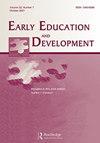Maternal Failure Mindsets and Parenting Styles: Exploring the Mediating Role of Maternal Attributions of Children’s Academic Failures
IF 2.2
3区 教育学
Q1 EDUCATION & EDUCATIONAL RESEARCH
引用次数: 0
Abstract
ABSTRACTThis study examines the mediating effects of parental attributions of children’s academic failures in the relationship between maternal failure mind-sets and their parenting styles. Participants were 323 preschool children aged 4–6 years old, with their mothers completing online questionnaires on failure mind-sets, parenting styles, and attribution of children’s academic failures. Research Findings: The results indicated that: (1) a failure-enhancing mindset was positively related to authoritative parenting and showed no significant correlation with authoritarian parenting. Conversely, a failure-debilitating mindset was negatively correlated with authoritative parenting and positively correlated with authoritarian parenting; (2) the mediating role of attribution varied depending on the mindsets. Effort attribution did not mediate the association between failure-enhancing mind-set and authoritative parenting. However, ability attribution played a significant role in mediating the relationship between failure-debilitating mind-set and authoritarian parenting. Mothers with a failure-debilitating mind-set tended to attribute children’s academic failures to a lack of ability, which subsequently increased maternal authoritarian parenting. Practice or Policy: These results provide valuable insights into the factors in influencing parenting styles, emphasizing the role of cognitive factors such as failure mind-sets and attributions of children’s academic failures. The findings suggest that cognitive interventions targeting parental beliefs, including failure mind-sets and attributions, could be crucial for improving parenting style. AcknowledgmentsThe execution of this paper was a combined effort on behalf of all authors. YL and XX conceptualized and designed the study. XX conducted the data collection and statistical analysis. XX, XL, and TG drafted the initial manuscript before YL contributed to the writing of the manuscript. All authors read and approved the final manuscript.Disclosure StatementNo potential conflict of interest was reported by the author(s).Ethical StatementAll procedures performed in the study involving human participants were in accordance with the ethical standards of the Research Ethics Committee of Shanghai Normal University. Informed consent was obtained from all individual participants in the study.Additional informationFundingThis study was supported by was funded by STI 2030—Major Projects [grant number 2022ZD0209000] and the Humanities and Social Science Foundation of Shanghai Normal University [grant number 310-AC7031-20-003010]. The funding agents had no role in the study design; collection, analysis, and interpretation of the data; or writing of the manuscript.母亲失败心态与教养方式:探讨母亲归因对儿童学业失败的中介作用
摘要本研究探讨了父母学业失败归因在母亲失败心态与教养方式关系中的中介作用。参与者是323名4-6岁的学龄前儿童,他们的母亲完成了关于失败心态、养育方式和孩子学业失败原因的在线问卷。研究发现:结果表明:(1)失败强化心态与权威型父母教养方式呈正相关,与权威型父母教养方式无显著相关。反之,失败衰弱心态与权威型父母教养方式负相关,与权威型父母教养方式正相关;(2)归因的中介作用因心态而异。努力归因并没有调节失败强化思维模式与权威型父母教养方式之间的关联。然而,能力归因在失败-衰弱思维模式与专制教养之间的关系中起着重要的中介作用。具有挫败心态的母亲倾向于将孩子的学业失败归因于缺乏能力,这随后增加了母亲的专制教育。实践还是政策:这些结果为影响父母教养方式的因素提供了有价值的见解,强调了认知因素的作用,如失败心态和儿童学业失败的归因。研究结果表明,针对父母信念的认知干预,包括失败心态和归因,可能对改善父母的方式至关重要。本文的执行是代表所有作者共同努力的结果。YL和XX对研究进行了构思和设计。XX负责数据收集和统计分析。在YL参与撰写之前,XX、XL和TG起草了初稿。所有作者都阅读并批准了最终的手稿。披露声明作者未报告潜在的利益冲突。伦理声明本研究中涉及人类受试者的所有程序均符合上海师范大学研究伦理委员会的伦理标准。所有参与研究的个体都获得了知情同意。本研究由国家科研院2030 -重大项目[批准号2022ZD0209000]和上海师范大学人文社科基金[批准号310-AC7031-20-003010]资助。资助机构在研究设计中没有任何作用;收集、分析和解释数据;或者写手稿。
本文章由计算机程序翻译,如有差异,请以英文原文为准。
求助全文
约1分钟内获得全文
求助全文
来源期刊

Early Education and Development
Multiple-
CiteScore
5.50
自引率
10.30%
发文量
78
期刊介绍:
Early Education and Development (EE&D) is a professional journal for those involved in educational and preschool services and research related to children and their families: early education supervisors, school psychologists, daycare administrators, child development specialists, developmental and child clinical psychologists, and special education administrators. It is designed to emphasize the implications for practice of research and solid scientific information. The age range focused upon is preschool through the primary grades. EE&D is a connecting link between the research community in early education and child development and school district early education programs, daycare systems, and special needs preschool programs.
 求助内容:
求助内容: 应助结果提醒方式:
应助结果提醒方式:


